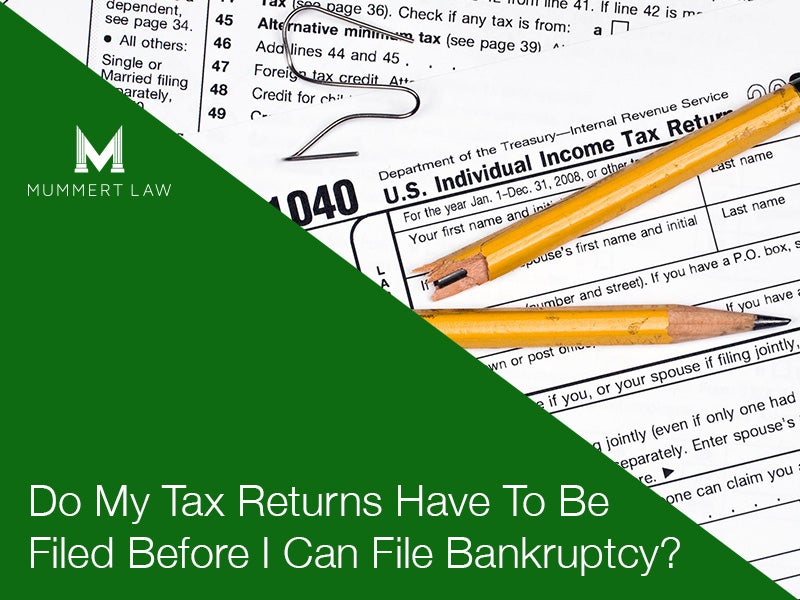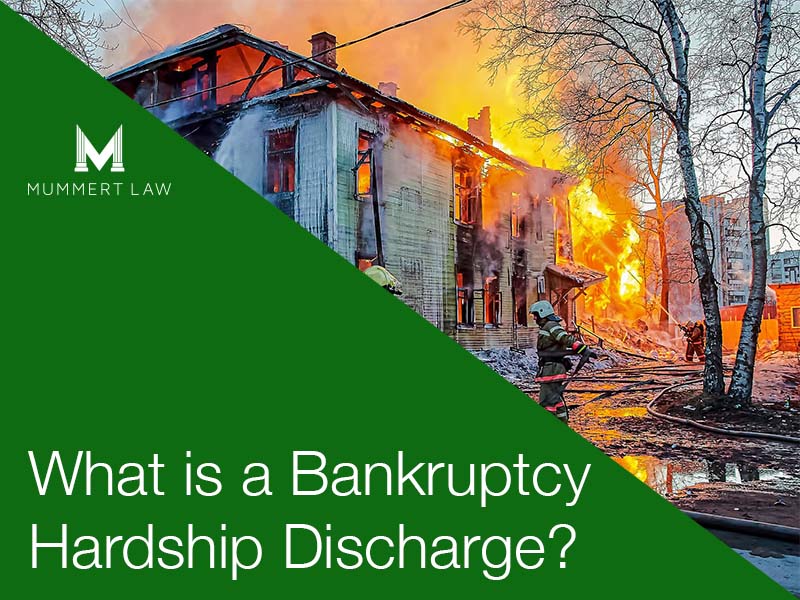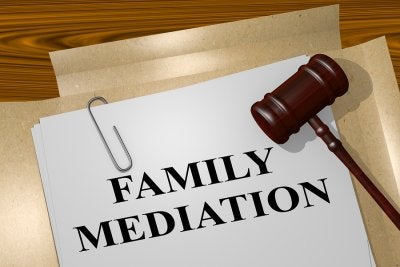-
Preparing for your Bankruptcy Consultation

During your bankruptcy consultation, you’ll meet with an attorney or paralegal to discuss your financial situation, goals, and why you think a Chapter 7 or Chapter 13 bankruptcy is the right step. Using that information, the bankruptcy attorney will determine if you’re a good candidate for bankruptcy and which type.
Here’s how to prepare for your meeting with the bankruptcy attorney.
Questions They Will Ask You
At your bankruptcy consultation, the attorney will have to ask you questions about your finances and life to know how they can best help you.
They’ll ask you what led you to consider bankruptcy, whether it’s medical bills, credit card debt, an income imbalance, or other reasons. They may also ask:
- What your marital status is
- If you have children
- What your and your spouse’s income is
- Are you separated or divorced from a spouse
- Do you have a marital or separation agreement
- Is there a Judgment of Absolute Divorce
- What your last six months of income is
- Whether you own a business or are an employee
- Approximate value of any assets you own
- If you’ve recently transferred or sold any property
- Whether you owe back taxes or are behind on alimony or child support payments
- If a creditor has sued you or has a judgment against you
- What you hope bankruptcy will achieve
Documents To Bring To Your Bankruptcy Consultation
You may receive a list of documents the attorney wants you to bring to your first bankruptcy consultation. If they don’t, this list can help you gather documents. Having your financial documents handy will make the process easier and help the attorney understand your financials to determine if you’re a bankruptcy candidate:
- Copies of your social security card and driver’s license
- Your last two years’ tax returns
- Bank statements for the previous six months
- Pay stubs for the last six months
- Current mortgage, car loan, and other debt statements
- The current estimate of your vehicle’s value (can get from NADA or Kelley Blue Book)
- Recent statements from investment and retirement accounts
- Copies of life insurance policies
- Foreclosure paperwork if your home is in foreclosure
- Copy of separation or divorce agreement, if applicable
Questions To Ask
Although the bankruptcy attorney will provide a lot of information, you’ll probably still have questions to ask them. Before the meeting, write down your questions so you’re prepared and won’t forget them.
Here are some ideas of questions to ask the bankruptcy attorney during your initial bankruptcy consultation:
- Should I file for Chapter 7 or Chapter 13 bankruptcy?
- Do you accept payments, or do I have to pay fees upfront?
- Can I keep my car and house?
- Can I keep my other property and bank accounts?
- What do your fees include?
- What do your fees not include?
- How long does it take to prepare and file my bankruptcy petition?
- Will I have to go to court for the bankruptcy hearings?
- How long does the process take?
Fees To Pay
Although your initial bankruptcy consultation is sometimes free, you must pay the attorney to take on your case. There will also be filing, court fees, plus additional costs for the credit counseling, debtor education course, credit report, and means test.
Bankruptcy law requires your attorney to provide a detail retainer outlining the initial costs and potential additional costs. Discuss the fees with the attorney and ask for a copy of the retainer agreement. Ensure you understand each fee, how much the entire process can cost, and your payment options.
Planning Your Bankruptcy Consultation with the Attorney
Preparing properly by gathering the necessary documentation and information will help make your consultation go smoothly and maximize your time with the bankruptcy attorney. Leave plenty of time to gather paperwork before your meeting, as it can be time-consuming.
How Mummert Law conducts its initial consultations
At Mummert Law, you will meet with an attorney, not a paralegal. Tim will ask a series of questions to have a basic understanding of your matter. The initial consultation can be in person or via Zoom.
Are you seeking a bankruptcy attorney in Maryland? Contact Mummert Law today to schedule your bankruptcy consultation. Tim Mummert has years of bankruptcy experience and can work with you to chart the best course of action!
-
Do My Tax Returns Have To Be Filed Before I Can File Bankruptcy?

Filing for bankruptcy without filing your tax returns can lead to many questions. One is whether you need to file your tax returns before bankruptcy. We’ll share key insights to help answer your questions so you can make the best decision for yourself and your family.
Chapter 7 Bankruptcy
Chapter 7 is designed to discharge most, if not all, of your debt in exchange for your property.
Your Tax Returns Don’t Have To Be Current with Chapter 7
There isn’t a rule stating that your tax returns must be current upon filing Chapter 7. However, you must provide your assigned trustee with a copy of your last filed return and accurate financial information. Your trustee will verify if your tax returns support the financial information you provided.
Suppose you filed your most recent return longer than the year before your bankruptcy. In that case, your trustee might ask for an explanation. A valid reason could include not working the year prior. However, the bankruptcy court could deny or discharge your bankruptcy filing if you aren’t honest or if you are missing information.
When Your Tax Returns Aren’t Current
If your tax returns aren’t current, any of your unfiled tax debts won’t be discharged. The Trustee may also take action requiring the filing of the tax returns to claim your tax refunds as an asset of the bankruptcy estate.
Chapter 13 Bankruptcy
The intent of Chapter 13 is for you to reorganize your debt. As a result, you can keep your valuable property (e.g., your house and cars) while paying off what you can over time. The repayment plan is typically set for three to five years.
Your Tax Returns Must Be Current When Filing Chapter 13
Unlike Chapter 7, your tax returns must be current when filing Chapter 13. Before the court approves your repayment plan, you must provide copies of your tax returns for the four most recent years. You must submit these to your appointed trustee before the 341 meeting of creditors. Suppose you aren’t required to file a tax return. In that case, you may have to submit a letter, affidavit, or certification with an explanation.
When Your Tax Returns Aren’t Current
You could impede your case if you haven’t filed your most recent tax return before your 341 meetings.
- Your trustee will file a motion, providing you with a short period to file your taxes and submit your returns. Upon missing the deadline, the court could immediately dismiss your case.
- The Internal Revenue Service may file a substitute return, estimating the amount you owe based on your previous income. These estimates could be higher than what you typically owe upon filing your taxes. This will result in problems in confirming your Chapter 13 Plan.
Remaining Current on Tax Returns After Filing Chapter 13
Because paying back your debt occurs over several years in Chapter 13, it’s essential to remain current on your tax returns. Your trustee will require your local, state, or federal returns each year of the repayment plan process. If your returns become delinquent, your case could be dismissed.
Whether you’re filing Chapter 7 or Chapter 13, we at Mummert Law recommend being current with your tax returns. Being up-to-date causes fewer potential hindrances to your case. You’ll have a better opportunity to attain a fresh financial start. Although it can be challenging, we can help you discover the right option for you and your family. We’re available for a consultation. We’ll sit down together, evaluate your position, and determine how to proceed. So don’t go it alone when it comes to bankruptcy. Make your appointment with Mummert Law today!
-
Can You Pay off Chapter 13 Bankruptcy Early?

When you file for a Chapter 13 bankruptcy in Maryland, you agree to pay back a portion or all of your debt using your future income. The payment plan amount is based on your future income and the amount of debt to be repaid and usually lasts between three and five years. Once you’ve repaid the total amount owed, the rest is discharged according to the agreement between the court and your creditors.
But if you’ve come into some money before the payment plan is over, you may want to pay off the rest of your debt to move on with discharge. While you may be able to pay off your Chapter 13 bankruptcy early, it might not be in your best interest to do so.
The Specifics of Your Chapter 13 Bankruptcy Matter
No law says you can’t pay off your bankruptcy debt early. But before you do, you should consult a bankruptcy attorney first to ensure it won’t negatively affect your payment plan.
If your payment plan was created to pay back 100% of the debt you owe, you shouldn’t face any issues repaying it early. But if the program doesn’t repay 100% of the debt owed, the courts may require you to include it in your bankruptcy filing.
Once the Trustee is aware of the increase in your estate, it could trigger an amendment to your payment plan. The amended plan may require you to pay more of the debt owed, resulting in higher payments for the rest of the planned time.
The Benefit of Sticking With Your Existing Plan
Even though it’s an attractive option to repay your debt early to move on from your Chapter 13 bankruptcy, you are probably better off sticking with the plan already in place. Of course, suppose you owe 100%, and your debts have just been restructured to prevent more delinquencies on your credit or foreclosure of your home. In that case, you’re probably safe paying it early.
If you owe less than 100%, you are usually better off saving the extra money you have now. This way, you can ensure you have the money to pay your payment plan on time until you pay it in full. Once you’ve paid it off, the rest of your outstanding debts will be discharged, and you will owe nothing more.
Find Out the Best Choice For Your Bankruptcy Situation
The law is complicated in Maryland, and bankruptcy law is no exception. Most people would benefit from not repaying their Chapter 13 bankruptcy early. Some would find that getting discharged early is a valuable solution to their problem. If you’re unsure if your situation is the exception to the rule, don’t hesitate to reach out to Mummert Law.
We can schedule a consultation to sit down together, and discuss your bankruptcy situation, how you’ve come into the money, and whether it would benefit you to end your payment plan early. Schedule an appointment with us today, so we can help you make the right decision.
-
Warning Signs That Can Lead To Bankruptcy

Finances are complicated for many people these days, and we see record numbers of new bankruptcy cases across the state. But there are signs and symptoms to be aware of that indicate you may be headed for bankruptcy. And being aware of these indicators while working alongside our team at Mummert Law can ultimately help you experience financial relief.
Signs and Symptoms of Bankruptcy for Individuals
There are a variety of indications that you may be on your way to bankruptcy. Though they’re pretty standard, we understand that they can be stressful if you’re experiencing them. The following are some of those early warning signs.
1. If you have more bills or expenses than you can pay
One key indicator is that you have more money going out than coming in. Eventually, you’ll need to manage those expenses. If not, you could face significant financial stress.
2. A life-changing event occurs
Divorce, medical emergencies, a death, or unforeseen layoff can all lead to financial struggles. Once you get behind, bills can add up, and you could face increasing challenges in paying them off.
3. Accumulating credit card debt
People often turn to credit cards when their money runs empty. Unfortunately, this causes a snowball effect. Once your cards have maxed out, you may have to take out a home equity line of credit or pull from your retirement. As a result, you may find that you’re in a financial hole from which you can’t break free.
In addition, paying minimum payments or making late payments, resulting in fees and high-interest rates, can also indicate that you may have to look at bankruptcy.
4. Being contacted by bill collectors and creditors
If you’re 30 days delinquent on your credit card, car, or house payment, don’t be surprised if collection agencies begin contacting you. Their persistent phone calls can add stress and anxiety to an already overwhelming situation.
5. Borrowing money
Another early indicator that you could face bankruptcy is borrowing money from those close to you. You could also be taking cash advances from one credit card to cover another, entangling you and an increasing debt pile.
6. You can’t cover necessary expenses
If you have to put off essential expenditures, like healthcare, you may be at risk of filing for bankruptcy soon.
7. You are often stressed or worried over financial concerns.
Concerns over finances can happen periodically for many people. But if you’re finding that it’s a regular occurrence, causing chronic anxiety, you may be headed for bankruptcy. And to top it off, you may experience health problems due to your stress.
Signs and Symptoms of Bankruptcy for Businesses
Similar to individuals, businesses can also be at risk of filing for bankruptcy. While there is some overlap with personal indicators, organizations face unique challenges and bankruptcy symptoms. The following are some early warning indicators:
- Continual decreases in your cash flow
- Critical leaders or employees leave your organization
- Low cash amount or capital balance
- Unable to satisfy debt obligations like loan or lease payments
- Struggles to meet payroll obligations
- Increasing credit card interest rates
- Continual contact with collection agencies
Being aware of signs and symptoms that predict your potential road to bankruptcy can be a vital first step in finding financial relief. And if you are experiencing any of these warning signs and are concerned bankruptcy is near, we can help! At Mummert Law, we’re available for a consultation. At this time, we’ll sit down together, evaluate your position, and determine the best way to proceed. So don’t go it alone when it comes to financial struggles. Make your appointment with Mummert Law today!
-
What’s A Bankruptcy Hardship Discharge?

Unlike a Chapter 7 bankruptcy, which absolves you from making future payments to your creditors, a Chapter 13 bankruptcy requires a payment plan to be paid in full before discharge. Typically, the debtor pays on this plan for three to five years, with payments determined by debt totals and future income.
But what if something happens during the repayment term, making you unable to pay the agreed-upon payments? Sometimes, things happen that are beyond our control. In these cases, there is a provision in the bankruptcy code, § 1328(b), the hardship discharge.
A bankruptcy hardship discharge is a provision in the code that allows you to stop payments before paying the plan in full but still receive a Chapter 13 discharge. The courts don’t grant this provision often, and it’s only used in extreme cases when all other options are first exhausted.
In What Instances Can A Bankruptcy Hardship Discharge Be Granted?
For a bankruptcy hardship discharge to be granted, the circumstances must occur outside of your control. The court hears each case individually, subject to its jurisdiction and bankruptcy judge. Still, some scenario examples of granting a hardship discharge include:
- Severe illness or injury preventing work
- Job loss
- Debtor death
- Death of debtor’s spouse
- Catastrophic home fire
- Debtor terminal illness
What Requirements Must You Meet for A Bankruptcy Hardship Discharge?
You must exhaust all interventions first before the court considers a bankruptcy hardship discharge in Maryland. When you notify your Trustee of your hardship, they will determine if it’s possible to modify your payment plan agreement.
This may include extending your plan term if it isn’t already at the maximum of five years. Depending on your existing payment amount, the Trustee could also try to lower your payments if they aren’t already at the minimum amount.
Another requirement you must meet to be considered for a bankruptcy hardship discharge is the minimum distribution amount. This means you must have paid your unsecured creditors at least as much as a Chapter 7 bankruptcy liquidation would write off. Meeting this requirement could be challenging if you have significant equity in your primary residence, especially given Maryland’s recent boom in home and property values.
Are There Other Options Besides a Bankruptcy Hardship Discharge?
Yes, there are other options besides a bankruptcy hardship discharge. If the court doesn’t grant you a hardship discharge, you may be able to convert your Chapter 13 case to a Chapter 7 case. You could also dismiss your Chapter 13 case and refile immediately to have a new case heard based on your current situation.
Filing For A Hardship Discharge?
You could be right if you believe you qualify for a hardship discharge. However, there are enough nuances and exceptions within the code, meaning this situation requires a knowledgeable bankruptcy attorney.
Mummert Law in Glen Burnie, Maryland, can review your case and help you decide how to move forward. Contact us today to schedule an appointment to determine if you qualify for a bankruptcy hardship discharge in Maryland.
-
Why is Your FICO Score Important?

If you want to finance anything, you need a good credit score. You could pay thousands of dollars in high interest with a poor credit score compared to someone with good or better credit.
What is Your FICO Score?
There are three main credit bureaus: Equifax, Experian, and TransUnion. The most common one used by lenders and other companies is Equifax. The Fair Isaac Corporation created the FICO score about thirty years ago as an industry-standard number of score creditworthiness.
When you take out a loan, your credit score is one of the most significant factors used to determine eligibility, how much you can finance, and your interest rate. Utility companies, cell phone providers, and landlords use your credit score to determine eligibility, if you owe a deposit, and how much you owe. In Maryland, insurance companies can also use your credit score as a factor when determining your auto insurance premium.
The higher your credit score, the less risky it is for a lender to finance your loan. This translates to a low-interest rate, fewer fees, and more available credit. People with a high credit score have more advantages, commanding lower payments and their choice of lenders. For rentals, utilities, and cell phone plans, those with high credit scores may be able to forgo a security deposit or secure a better apartment in a more desirable neighborhood than someone with a lower credit score.
What is a Good FICO Credit Score?
A FICO credit score is a three-digit number between 300 and 850. According to Experian data, The average U.S. credit score is 711 as of 2020. Credit scores fall into ranges and determine your creditworthiness.
- Exceptional: 800 and over
- Very good: 740-799
- Good: 670-739
- Fair: 580-669
- Poor: <580
As you can see, the average credit score falls into the Good range. Anything better than average is your goal if you want the best choice in lender, interest rate, and loan terms.
How Can I Build Credit Without Taking on Debt?
You can’t build a credit score if you don’t use credit. You can use two strategies to build your credit and gain a good or better score.
The first is getting a secured credit card. You deposit in the bank, and they offer you a credit card with the deposit amount as your credit line.
Another way is to get a credit-builder loan, which works the same way. You deposit money into a savings account or certificate of deposit (CD). After making on-time payments for a length of time, you get your money back. You can usually get a credit-builder loan from a credit union or community bank.
How to Build Good Credit Habits
Getting a high credit score is easy when you’re first starting. But it’s even easier to create bad habits that translate to poor credit scores. Here are a few tips for building great credit habits:
- Always pay your bills on time or early.
- Don’t carry balances by paying your bills in full.
- Use your credit cards regularly, but try to stay under 30% of your credit limit.
- Don’t close accounts because it can negatively impact your credit score. Just stop using them.
Building an excellent FICO score is an essential part of your financial strategy. If you are overwhelmed with credit obligations, and your FICO score is suffering, contact Mummert Law for a consultation to see if bankruptcy is a good option for you!
-
Is an 84-Month Car Loan a Good Idea?

If you’re in the market for a new or used car, you may need a loan to buy it. When you work with a lender for financing, you can usually name your monthly budget, and they’ll do what it takes to meet that number or get just below it.
One way lenders do this is to extend the loan period. This is how we have gotten to 84-month car loans. When you finance a car with an 84-month auto loan, the purchase price and finance charges are spread over seven years.
Is an 84-month car loan a good option for you? Consider the benefits and drawbacks of a seven-year auto loan before signing on the dotted line.
Benefits of an 84-Month Car Loan
Low Monthly Payments
The longer you spread out the cost, the lower your monthly payments. An 84-month car loan can make it manageable for buyers on a tight budget to afford a new car. However, this could also signify that the vehicle you’re buying exceeds what you can afford. You may be better off choosing a cheaper model.
Low-Interest Rates
When interest rates are low — as they have been for some time — borrowing for a more extended time can make sense. How much you pay in interest over the loan term depends on the final cost of the car and the interest rate for which you qualify. If you have a lot of debt but can qualify for a low rate, accepting a longer loan term could make sense to tackle the rest of your high-interest debts.
Drawbacks of an 84-Month Car Loan
While there are a few benefits to taking out an 84-month loan, there are also some drawbacks.
Cars Depreciate Quickly
While owning a home is an appreciating asset, meaning the value increases over time, a car is the opposite. New cars lose some of their value the minute you drive them off the lot, and the value continues to decrease as the mileage and age increase.
With an 84-month auto loan, you could be underwater on the loan by the end when you owe more than the car is worth. Suppose you have negative equity and get into an accident where the vehicle is a total loss or decide to sell it before paying the loan in full. In that case, you will still owe on a vehicle you can’t drive anymore. You may be able to roll the negative equity into a new car payment, but that would mean you’re already underwater on a brand-new car.
The Loan Outlives the Warranty
Depending on the car manufacturer, the car loan may outlive the warranty. In this case, you’ll still be paying for the car payment and have to shoulder more of the cost of repairs. The older your car gets, the more it typically costs to repair, making your vehicle cost more than your budget allows.
Higher Cost Overall
The longer you pay on a loan, the more you pay in interest. For instance, you’ll pay about $1,300 in interest on a $20,000 car with a 2.5% interest rate. The same loan over 84 months would amount to about $1,820, over $500 more.
Circumstances When an 84-Month Car Loan is a Good Option For You
While an 84-month loan may not be the best solution for everyone, sometimes you’re on a tight enough budget to warrant it. Here are some reasons an 84-month car loan is a good option for you:
- You have an extended warranty beyond the loan term.
- There is no prepayment penalty.
- This loan term is the only one that fits into your budget.
- It allows you to afford a more reliable or safer car.
- You have higher interest debts and can qualify for a low-interest car loan.
As with most financial agreements, be cautious and weigh the advantages and disadvantages of your options. If you are overwhelmed by debt that makes it hard to buy a new vehicle, contact us for a consultation to see what advice we can offer.
-
What is a Joint Trust?

Few people go into marriage expecting it to end in divorce, especially when you have kids. But more than half of first marriages end in divorce, and many divorcees marry for a second time.
Before you blend your families together, discussing what will happen when one or both of you pass away is essential. One way to ensure your desires are met when you die is to create a trust. A joint trust may be a solution, as it is a way to avoid probate and pass on assets to your beneficiaries.
A joint trust is a single trust created and funded that covers both spouses. The spouses are co-trustees, and the trust can include individual and joint property and assets.
How Does a Joint Trust Work?
With a joint trust, two people, usually spouses, become co-trustees to a single trust. When the first spouse dies, the surviving spouse is now the sole trustee and manager of the trust.
Once the remaining spouse passes away, the joint trust cannot be changed and is now an irrevocable trust. The designated successor trustee is now the manager of the trust. They are responsible for distributing the assets to the beneficiaries under the trust document instructions.
Who Should Have a Joint Trust?
There are benefits to a joint trust between spouses, but it isn’t a solution for every marriage.
In community property states, joint trusts are especially beneficial. Since both spouses own all property and assets acquired after marriage, a joint trust can make it easier to distribute assets upon death. Maryland is not a community property state, so this may not be as beneficial to Maryland residents entering a first or second marriage.
A joint trust is usually easier to maintain than two separate trusts and is more cost-effective. A joint revocable trust between spouses allows for asset and term changes while both are still alive.
Both spouses have equal control over the trust and the assets involved. You should only consider a joint trust if you expect this marriage to last until death. If you die first, your spouse is the sole owner of the trust. Logistically, dividing assets within a joint trust can be challenging if you divorce.
Who Shouldn’t Have a Joint Trust?
Both spouses must agree on any changes or adjustments within the joint trust. If you want to handle your assets differently than your spouse, a joint trust may not be for you.
If either of you expects a large amount of money at any point in the future, you may want to rethink a joint trust. It could affect the amount of estate tax due. If you improperly draft the trust, it could also disqualify you from the marital deduction.
If you or your spouse get sued or owe money to someone or an entity, like the IRS, a joint trust may not be in your best interest. Creditors can seize assets from a joint revocable trust, even if the debt is just for one spouse.
How Can I Create a Joint Trust?
Creating a properly executed joint trust is not easy. To ensure it’s enforceable and properly drafted, it’s best to hire an estate attorney. Schedule a consultation with Mummert Law to answer your trust questions, find out if a joint trust is right for you, and create one.
-
What Is the Role of Children During the Custody Mediation Process?
Mediation is an effective alternative to court. During mediation sessions in Baltimore, a neutral third party helps parties who are at odds with each other explore the issues and discover mutually agreeable solutions. Mediation is useful for many situations, including family law matters such as child custody disputes. Even when parents have experienced significant breakdowns in communication, they may decide to attempt custody mediation in order to make the arrangements themselves, rather than entrust the custody decisions to a judge.

Children may have a limited role in custody mediation.
In most cases, children are not involved in settling custody disputes. Family law judges do not generally want to see minor children in the courtroom because of the significant stress this can inflict and the potential damage to family relationships. The same is true of custody mediation sessions. One of the goals of settling custody disputes is to avoid putting children in the middle; they should never feel as though they must choose one parent over the other. That being said, there may be some situations in which children can play a very limited role in custody mediation, provided that neither of the parents attempts to influence the children.
Children can aid in the identification of challenges.
Although children may not participate in the actual mediation sessions with all three parties, the mediator may decide to meet with the children separately to hold a low-stress discussion of the family situation. The mediator must be careful not to create a psychologically difficult situation for the children. Instead of asking a question such as, “Which parent would you rather live with?” the mediator might ask, “Who usually helps you with your homework?” The mediator might also prompt the children to identify challenges that may be settled during the mediation sessions. For example, a child might express concern about being able to participate in sports or other after-school activities despite the visitation schedule. The mediator can then bring these challenges into the mediation sessions and guide the parents in working toward solutions.
-
Tips for Talking to Your Family About Advanced Medical Directives
It may not be pleasant to think about what might happen to you if you become incapable of expressing your care preferences , but it is necessary to prevent interpersonal conflicts among family members. The document in which you can specify your healthcare preferences is called an advanced medical directive or a living will. Consider talking to an estate planning attorney in Baltimore about creating your advanced medical directive before speaking with your family about it.
When you are ready to discuss your living will with your family, watch this interview with a physician to get some helpful tips. He recommends that you first reassure your loved ones that you are not seriously ill, depressed, or otherwise experiencing trouble. This physician also discusses what adult children might consider when broaching this subject with their aging parents and he explains the types of decisions that a living will can encompass.

